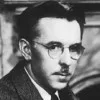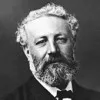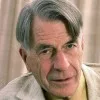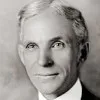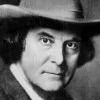Conflict acting on intelligence creates imagination. Faced with conflict, creatures are forced to imagine what will happen, where the next threat will come from. If there has never been conflict, imagination never develops. Wits arise in answer to danger, to pain, to tragedy. No one ever got smarter eating easy apples.
Quotations about:
prediction
Note not all quotations have been tagged, so Search may find additional quotes on this topic.
SECOND WITCH: By the pricking of my thumbs,
Something wicked this way comes.William Shakespeare (1564-1616) English dramatist and poet
Macbeth, Act 4, sc. 1, l. 44ff (4.1.44-45) (1606)
(Source)
Often misquoted as "prickling."
Take awl the prophecys that hav cum tew pass, and awl that hav caught on the center, and failed tew cum tew time, and make them up into an average, and yer will find, that buying stock, on the Codfish Bank ov Nufoundland, at 50 per cent, for a rise, iz, in comparison, a good spekulatiff bizziness.
[Take all the prophecies that have come to pass, and all that have caught on the center and failed to come to time, and make them up into an average, and you will find that buying stock on the codfish Bank of Newfoundland, at 50 percent, for a rise, is, in comparison, a good speculative business.]Josh Billings (1818-1885) American humorist, aphorist [pseud. of Henry Wheeler Shaw]
Everybody’s Friend, Or; Josh Billing’s Encyclopedia and Proverbial Philosophy of Wit and Humor, ch. 150 “Affurisms: Parboils” (1874)
(Source)
As to the Weather, if I were to fall into the Method my Brother J****n sometimes uses, and tell you, Snow here or in New England, — Rain here or in South-Carolina, — Cold to the Northward, — Warm to the Southward, and the like, whatever Errors I might commit, I should be something more secure of not being detected in them: But I consider, it will be of no Service to any body to know what Weather it is 1000 miles off, and therefore I always set down positively what Weather my Reader will have, be he where he will at the time. We modestly desire only the favourable Allowance of a day or two before and a day or two after the precise Day against which the Weather is set; and if it does not come to pass accordingly, let the Fault be laid upon the Printer, who, ’tis very like, may have transpos’d or misplac’d it, perhaps for the Conveniency of putting in his Holidays: And since, in spight of all I can say, People will give him great part of the Credit of making my Almanacks, ’tis but reasonable he should take some share of the Blame.
Benjamin Franklin (1706-1790) American statesman, scientist, philosopher, aphorist
Poor Richard (1737 ed.)
(Source)
"Brother J****n" is John Jerman, whose almanac Franklin had printed for several years, but who in 1737 moved to a different printer. Weather, forecast, prediction, blame
Men should not be too smug in their own reason;
only a foolish man will walk his field
and count his ears too early in the season;
for I have seen a briar through winter’s snows
rattle its tough and menacing bare stems,
and then, in season, open its pale rose.
and I have seen a ship cross all the main,
true to its course and swift, and then go down
just as it entered its home port again.[Non sien le genti, ancor, troppo sicure
a giudicar, sì come quei che stima
le biade in campo pria che sien mature;
ch’i’ ho veduto tutto ’l verno prima
lo prun mostrarsi rigido e feroce,
poscia portar la rosa in su la cima;
e legno vidi già dritto e veloce
correr lo mar per tutto suo cammino,
perire al fine a l’intrar de la foce.]Dante Alighieri (1265-1321) Italian poet
The Divine Comedy [Divina Commedia], Book 3 “Paradiso,” Canto 13, l. 130ff (13.130-138) [Thomas Aquinas] (1320) [tr. Ciardi (1970)]
(Source)
(Source (Italian)). Alternate translations:Let none presume to fix his final state,
Or on such awful question hold debate;
Oft have I seen the vernal stem beguile
The reaper's hand: and oft the rigid thorn,
That to the blast of winter waves forlorn,
In June with rosy wreath is seen to smile.
Oft-times the bark that feuds with prosp'rous gale
Thro' the dividing waves with flowing sail.
Yet sinks in view of port, the pious man
May fail.
[tr. Boyd (1802), st. 23-24]Let not the people be too swift to judge,
As one who reckons on the blades in field,
Or ere the crop be ripe. For I have seen
The thorn frown rudely all the winter long
And after bear the rose upon its top;
And bark, that all the way across the sea
Ran straight and speedy, perish at the last,
E’en in the haven’s mouth.
[tr. Cary (1814)]Let not the people be too swift to judge,
Like one who looks upon the springing blade,
As if the harvest were already made.
For I have seen, the whole of winter long,
The thorn look rude and rough, and bare at top,
And after show the rose's reddening cup;
And seen the bark, already swift direct
Across the sea, in all its journey's way,
Perish at last when entering in the bay.
[tr. Bannerman (1850)]Nor yet shall people be too confident
In judging, even as he is who doth count
The corn in field or ever it be ripe.
For I have seen all winter long the thorn
First show itself intractable and fierce,
And after bear the rose upon its top;
And I have seen a ship direct and swift
Run o'er the sea throughout its course entire,
To perish at the harbour's mouth at last.
[tr. Longfellow (1867)]Let not the folk be yet too secure at judging, like him who values the corn in a field before it is ripe; for I have seen all winter long the plum-tree at first show itself rigid and stern, and afterward bear blossoms on its top ; and I saw on a time a craft trim and swift to sail the sea for its whole course, perish at the last in the entering of the sound.
[tr. Butler (1885)]Let not the people think themselves elected
To judge like one who counteth on the corn
Within his field ere it be ripe.
Dejected I have beheld through winter time a thorn
Its rude repelling aspect show, and bear
After a rose, upon its top forlorn.
And I have seen a vessel swiftly steer
Through all its voyage across the ocean stream.
Perish at last, the harbour's entrance near.
[tr. Minchin (1885)]Let not the people still be too secure in judgment, like him who reckons up the blades in the field ere they are ripe. For I have seen the briar first show itself stiff and wild all winter long, then bear the rose upon its top. And I have seen a bark ere now ran straight and swift across the sea through all its course, to perish at last at entrance of the harbor.
[tr. Norton (1892)]Let not folk yet be too secure in judgment, as who should count the ears upon the field ere they be ripe;
for I have seen first all the winter through the thorn display itself hard and forbidding and then upon its summit bear the rose;
and I have seen ere now a ship fare straight and swift over the sea through her entire course, and perish at the last, entering the harbour mouth.
[tr. Wicksteed (1899)]So also let not the people be too sure in judging, like those that reckon the corn in the field before it is ripe. For I have seen the briar first show harsh and rigid all through the winter and later bear the rose upon its top, and once I saw a ship that ran straight and swift over the sea through all its course perish at the last entering the harbour.
[tr. Sinclair (1939)]Let not the people be too self-assured
In judging early, as who should count the rows
Of green blades in the field ere they matured.
For I have seen how first the wild-brier shows
Her sprays, all winter through, thorny and stark,
And then upon the topmost bears the rose;
And I have seen ere now a speeding barque
Run all her sea-course with unswerving stem
And close on harbour go down to the dark.
[tr. Binyon (1943)]No one should ever be too self-assured
In judgement, like a farmer reckoning
His gains before the corn-crop is matured,
For I have seen the briar, a prickly thing
And tough the winter through, and on its tip
Bearing the very rose at close of spring;
And once I saw, her whole long ocean trip
Safe-done, a vessel wrecked upon the bar,
And down she went, that swift and stately ship.
[tr. Sayers/Reynolds (1962)]Moreover, let not folk be too secure in judgment, like one who should count the ears in the field before they are ripe; for I have seen first, all winter through, the thorn display itself hard and stiff, and then upon its summit bear the rose. And I have seen ere now a ship fare straight and swift over the sea through all her course, and perish at the last as she entered the harbor.
[tr. Singleton (1975)]Let people not be too sure of themselves
And their judgement, like someone who reckons
The field of corn before the ears are ripe:
For I have seen all the winter through
The thorn first show itself unyielding, wild,
And after all carry a rose on top;
And I have seen a ship sail straight and swiftly
Over the sea for the whole of its voyage
Yet perish at last at the harbour mouth.
[tr. Sisson (1981)]So too, let men not be too confident
in judging -- witness those who, in the field,
would count the ears before the corn is ripe;
for I have seen, all winter through, the brier
display itself a stiff and obstinate,
and later, on its summit, bear the rose;
and once I saw a ship sail straight and swift
through all its voyaging across the sea,
then perish at the end, at harbor entry.
[tr. Mandelbaum (1984)]Nor should one be too quick to trust his judgment;
be not like him who walks his field and counts
the ears of corn before the time is ripe,
for I have seen brier all winter long
showing its rough and prickly stem, and then
eventually produce a lovely rose,
and I have seen a ship sail straight and swift
over the sea through all its course, and then
about to enter in the harbor, sink.
[tr. Musa (1984)]And let not people be too sure to judge, like one who appraises the oats in the field before they are ripe:
for I have seen all the previous winter long the thornbush appear rigid and and fierce, but later bear the rose upon its tip,
and I have seen a ship run straight and swift across the sea for all in its course, only to perish at last when entering the port.
[tr. Durling (2011)]Do not let people be too secure in their judgements, like those who count the ears of corn in the field before the crop ripens, since I have seen, all winter long, the thorn display itself, sharp and forbidding, and then on its summit bear the rose; and before now I have seen a ship run straight and sure over the sea for her entire course, and sink in the end, entering the harbour mouth.
[tr. Kline (2002)]And then again, don't let folk be too sure
in passing judgement as do those who price
the harvest in the field before it's ripe.
For I have seen, at first, all winter through
a thorn bush shows itself as stark and fierce,
which after bears a rose upon its height.
And I have seen a keel, steered swift and well,
speed over oceans all its voyage through,
then perish at the entrance to the dock.
[tr. Kirkpatrick (2007)]Let the people, then, not be too certain
in their judgments, like those that harvest in their minds
corn still in the field before it ripens.
For I have seen the briar first look dry and thorny
right through all the winter's cold,
then later wear the bloom of roses at its tip,
and once I saw a ship, which had sailed straight
and swift upon the sea through all its voyage,
sinking at the end as it made its way to port.
[tr. Hollander/Hollander (2007)]But ordinary people, too, must guard
Their judgment, not like those who count up ears
Of corn before the field is ripe. For I
Have seen, all winter through, bushes of thorn
Covered with small but savage knives, hard
And fierce, but now comes summer, and they they're roses
All over. And I have seen a ship sail far,
Straight and swift, and on course, but once in the harbor
Down she goes, sinking like a stone.
[tr. Raffel (2010)]
BANQUO: If you can look into the seeds of time
And say which grain will grow and which will not,
Speak, then, to me, who neither beg nor fear
Your favors nor your hate.William Shakespeare (1564-1616) English dramatist and poet
Macbeth, Act 1, sc. 3, l. 61ff (1.3.61-64) (1606)
(Source)
To the Witches (Weïrd Sisters).
When we look forward and try to project what may come out of a development, we are always wrong, because the by-products sometimes become far more important than the primary thing you started out to accomplish. Nevertheless, unintelligent motion is a great deal more important in research than intelligent standing still.
Charles F. Kettering (1876-1958) American inventor, engineer, researcher, businessman
“250 at Luncheon Honor Kettering,” New York Times (1936-11-11)
(Source)
There ain’t nobody on earth, I don’t care how smart they are, ever going to make me believe they will ever stop wars.
An economist is a man that can tell you anything about — he’ll tell you what can happen under any given conditions, and his guess is liable to be just as good as anybody else’s, too.
People often overestimate what will happen in the next two years and underestimate what will happen in ten.
Bill Gates (b. 1955) American software magnate [William Henry Gates III]
The Road Ahead, “Afterword” (1996 ed.)
(Source)
First use of this specific formulation, but similar phrases can be traced back to the 1960s. More discussion of variations on this theme: People Tend To Overestimate What Can Be Done In One Year And To Underestimate What Can Be Done In Five Or Ten Years – Quote Investigator®.
Expectations are resentments waiting to happen.
Anne Lamott (b. 1954) American novelist and non-fiction writer
Crooked Little Heart, ch. 4 (1997)
(Source)
If you make a great number of predictions, the ones that were wrong will soon be forgotten, and the ones that turn out to be true will make you famous.
Malcolm Gladwell (b. 1963) Anglo-Canadian journalist, author, public speaker
“Dangerous Minds: Criminal Profiling Made Easy,” The New Yorker (12 Nov 2007)
(Source)
NOBODY KNOWS ANYTHING. Not one person in the entire motion picture field knows for a certainty what’s going to work. Every time out it’s a guess — and, if you’re lucky, an educated one.
William Goldman (1931-2018) American screenwriter, novelist
Adventures in the Screen Trade, ch. 1 (1983)
(Source)
Nothing predicts future behavior as much as past impunity.
Darius Rejali (b. c. 1959) Iranian-American academic, political scientist
In Jane Mayer, “Torture and the Truth,” New Yorker (14 Dec 2014)
(Source)
Perhaps if we saw what was ahead of us, and glimpsed the crimes, follies, and misfortunes that would befall us later on, we would all stay in our mother’s wombs, and there would be nobody in the world but a great number of very fat, very irritated women.
I do so wish sometimes, that I could just pop home for an hour or two as easily in the flesh as in the spirit. No doubt the explorers of 2015, if there is anything left to explore, will not only carry their pocket wireless telephones fitted with wireless telescopes but will also receive their nourishment and warmth by wireless means & also their power to drive their motor sledges, but, of course, there will be an aerial daily excursion to both Poles then & it will be the bottom of the Atlantic, if not the centre of the earth, that will form the goal in those days.
Thomas Orde-Lees (1877-1948) British naval officer, arctic explorer, mountaineer, writer
Diary, aboard HMS Endurance (1915-01-10)
Written while the ship was trapped in the ice during Ernest Shackleton's ill-fated Imperial Trans-Antarctic Expedition. Some versions of the quotation refer to "2012," rather than 2015.
While the reference to "pocket wireless telephones" makes this quotation suspect, Orde-Lees has extensive diary material published, and this appears to be genuine.
After titanic studies he was satisfied that a thorough knowledge of the past could lead a profound scholar to predict the future course of history with greater accuracy, provided that it did not turn out quite differently.
Aubrey Menen (1912-1989) British writer, novelist, satirist, theatre critic
The Ramayana (1954)
(Source)
Prudent men are in the habit of saying — and not by chance or without basis — that he who wishes to see what is to come should observe what has already happened, because all the affairs of the world, in every age, have their individual counterparts in ancient times. The reason for this is that since they are carried on by men, who have and always have had the same passions, of necessity the same results appear.
Niccolò Machiavelli (1469-1527) Italian politician, philosopher, political scientist
The Discourses on Livy, Book 3, ch. 43 (1517) [tr. Gilbert (1958)]
(Source)
Alt. trans.: "The wise are wont to say, and not without reason or at random, that he who would forecast what is about to happen should look to what has been; since all human events, whether present or to come, have their exact counterpart in the past. And this, because these events are brought about by men, whose passions and dispositions remaining in all ages the same naturally give rise to the same effects." [tr. Thomson]
‘Tis not, believe me, a wise man’s part to say, “I will live.” Tomorrow’s life is too late: live today.
[Non est, crede mihi, sapientis dicere “Vivam”:
Sera nimis vita est crastina: vive hodie.]Martial (AD c.39-c.103) Spanish Roman poet, satirist, epigrammatist [Marcus Valerius Martialis]
Epigrams [Epigrammata], Book 1, epigram 15 (1.15.11-12) (AD 85-86) [tr. Bohn’s (1859)]
(Source)
A sentiment echoed in 5.58. (Source (Latin)). Alternate translations:Trust me, it is not wise to say,
I'll live; 'twill be too late tomorrow,
Live if thou'rt wise today.
[tr. Oldmixon (1728)]"I'll live tomorrow," will a wise man say?
Tomorrow is too late, then live today.
[tr. Hay (1755), quoted in Bohn's, but not in Hay's own book]Tomorrow I shall live, the fool will say. [...]
Wouldst thou be sure of living? Live today.
[tr. Elphinston (1782), Book 2, ep. 45]No wisdom 'tis to say "I'll soon begin to live."
'Tis late to live tomorrow; live today.
[ed. Harbottle (1897)]It sorts not, believe me, with wisdom to say "I shall live."
Too late is tomorrow's life; live thou today.
[tr. Ker (1919)]"I'll live tomorrow," no wise man will say;
Tomorrow is too late. Then live today.
[tr. Francis & Tatum (1924), #10]To say, "I mean to live," is folly's place:
Tomorrow's life comes late; live, then, today.
[tr. Duff (1929)]It's not a wise man's part to say
"I'll live," Tomorrow's life is much to late.
Live! Today.
[tr. Bovie (1970)]Believe me, the wise man does not say "1 shall live." Tomorrow's life is too late. Live today.
[tr. Shackleton Bailey (1993)]No sage will e'er "I'll live tomorrow" say:
Tomorrow is too late: live thou today.
[tr. WSB]
How many things have been denied one day, only to become realities the next!
Jules Verne (1828-1905) French novelist, poet, playwright
From the Earth to the Moon (1865)
(Source)
Yes, but water decomposed into its primitive elements … and decomposed doubtless, by electricity, which will then have become a powerful and manageable force, for all great discoveries, by some inexplicable law, appear to agree and become complete at the same time. Yes, my friends, I believe that water will one day be employed as fuel, that hydrogen and oxygen which constitute it, used singly or together, will furnish an inexhaustible source of heat and light, of an intensity of which coal is not capable. Some day the coalrooms of steamers and the tenders of locomotives will, instead of coal, be stored with these two condensed gases, which will burn in the furnaces with enormous calorific power. There is, therefore, nothing to fear. As long as the earth is inhabited it will supply the wants of its inhabitants, and there will be no want of either light or heat as long as the productions of the vegetable, mineral or animal kingdoms do not fail us. I believe, then, that when the deposits of coal are exhausted we shall heat and warm ourselves with water. Water will be the coal of the future!
Jules Verne (1828-1905) French novelist, poet, playwright
The Mysterious Island, Part 2, ch. 11 (1874)
(Source)
We have two classes of forecasters: those who don’t know and those who know they don’t know.
John Kenneth Galbraith (1908-2006) Canadian-American economist, diplomat, author
(Attributed)
Variants:
- There are two classes of people who tell what is going to happen in the future: Those who don't know, and those who don't know they don't know.
- You can divide the world into those who don't know and those who don't know they don't know.
- There are those who don't know, and there are those who don't know they don't know.
- We have two kinds of forecasters: Those who don't know ... and those who don't know they don't know.
- There are two kinds of economists: those who don't know the future, and those who don't know they don't know.
Science is as yet in its infancy, and we can foretell little of the future save that the thing that has not been is the thing that shall be; that no beliefs, no values, no institutions are safe. So far from being an isolated phenomenon the late war is only an example of the disruptive result that we may constantly expect from the progress of science. The future will be no primrose path. It will have its own problems. Some will be the secular problems of the past, giant flowers of evil blossoming at last to their own destruction. Others will be wholly new. Whether in the end man will survive his ascensions of power we cannot tell. But the problem is no new one. It is the old paradox of freedom re-enacted with mankind for actor and the earth for stage.
J.B.S. Haldane (1892-1964) English geneticist [John Burden Sanderson Haldane]
“Daedalus, or Science and the Future,” speech, Cambridge (24 Feb 1923)
(Source)
Power-worship blurs political judgment because it leads almost unavoidably to the belief that present trends will continue. Whoever is winning at the moment will always seem invincible.
Forecast: To observe that which has passed, and guess it will happen again; to anticipate the future by guessing at the past; to predict that an event will happen, if it does, by basing calculations on events that have already happened, if they did.
Elbert Hubbard (1856-1915) American writer, businessman, philosopher
The Roycroft Dictionary (1914)
(Source)
Deserves death! I daresay he does. Many that live deserve death. And some die that deserve life. Can you give that to them? Then be not too eager to deal out death in the name of justice, fearing for your own safety. Even the wise cannot see all ends.
J.R.R. Tolkien (1892-1973) English writer, fabulist, philologist, academic [John Ronald Reuel Tolkien]
The Lord of the Rings, Vol. 2: The Two Towers, Book 4, ch. 1 “The Taming of Sméagol” (1954)
(Source)
Frodo recalling the words of Gandalf (approximately) in The Fellowship of the Ring.
The tactical result of an engagement forms the base for new strategic decisions because victory or defeat in a battle changes the situation to such a degree that no human acumen is able to see beyond the first battle. In this sense one should understand Napoleon’s saying: “I have never had a plan of operations.” Therefore no plan of operations extends with any certainty beyond the first contact with the main hostile force.
I have complete faith in the continued absurdity of whatever’s going on.
Jon Stewart (b. 1962) American satirist, comedian, and television host. [b. Jonathan Stuart Leibowitz]
Interview, Philadelphia Inquirer (2007-04-22)
(Source)
But this long run is a misleading guide to current affairs. In the long run we are all dead. Economists set themselves too easy, too useless a task, if in tempestuous seasons they can only tell us, that when the storm is long past, the ocean is flat again.
Our grand business undoubtedly is, not to see what lies dimly at a distance, but to do what lies clearly at hand.
Thomas Carlyle (1795-1881) Scottish essayist and historian
Essay (1829-06), “Signs of the Times,” Edinburgh Review, Vol. 49, No. 98, Art. 7
(Source)
Review of three 1829 books: Anticipation; or, an Hundred Years Hence; The Rise, Progress, and Present State of Public Opinion in Great Britain; Edward Irvine, The Last Days; or, Discourses on These Our Times.
Deserves it! I daresay he does. Many that live deserve death. And some that die deserve life. Can you give it to them? then do not be too eager to deal out death in judgment. For even the very wise cannot see all ends.
J.R.R. Tolkien (1892-1973) English writer, fabulist, philologist, academic [John Ronald Reuel Tolkien]
The Lord of the Rings, Vol. 1: The Fellowship of the Ring, Book 1, ch. 2 “The Shadow of the Past” [Gandalf] (1954)
(Source)
Frodo later recounts these words (approximately) to Sam in The Two Towers.

















